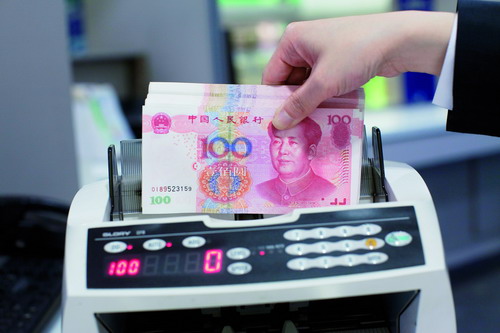Yuan moves toward liberalization
Updated: 2012-04-18 11:20
By Wang Xiaotian (China Daily)
|
|||||||||||
|
 Chinese banknotes pass through a currency counting machine. On Saturday, the country's central bank announced that the yuan will be allowed to fluctuate by 1 percent above and below a daily midpoint - double the previous limit of 0.5 percent. [Photo/Bloomberg] |
SAFE issues new rules on short positions for major lenders
China has taken another big step toward liberalizing the yuan's exchange rate by allowing banks to hold short positions in foreign currencies.
Banks that had foreign-exchange dealings of more than $1 billion in 2011 may hold $10 million worth of short positions, according to a statement released by the State Administration of Foreign Exchange late on Monday.
Banks with foreign-exchange dealings of between $100 million and $1 billion last year may have short positions worth $5 million, and those that had dealings worth less than $100 million may hold short positions worth $3 million.
Effective on Monday, the new rules apply to all lenders except for national banks and foreign-exchange market makers. The State Administration of Foreign Exchange said it will make another announcement pertaining to institutions in those categories.
The change is meant to further develop China's foreign exchange market, give banks more flexibility in trading in foreign exchange and make it easier to price the yuan, the administration said.
On Saturday, the country's central bank announced that the yuan will be allowed to fluctuate by 1 percent above and below a daily midpoint - double the previous limit of 0.5 percent.
"This is a measure that supports China's recent decision to widen the yuan's daily trading band," said Ding Zhijie, dean of the School of Banking and Finance at the University of International Business and Economics in Beijing.
"If the government wants the price of the yuan to better reflect the market, it must allow market players to have more of these sorts of positions."
He said market expectations pertaining to the yuan have changed in recent months. Even so, the present system of setting the currency's price is unlikely to allow it to fluctuate greatly. He said important world currencies will be little affected by the decision to allow short positions to be taken in foreign exchange.
The new rules also signaled that the authorities are no longer worried about appreciation pressures, Dariusz Kowalczyk, a Hong Kong-based strategist at Credit Agricole CIB, was quoted by Bloomberg as saying.
China used to take upward pressure off the yuan by preventing banks from buying it, Kowalczyk said.
"The new announcement clears a large technical hindrance that had hampered investors from settling foreign exchange according to their wishes, which indicates that China is becoming more confident that it can manage the volatility of the yuan," according to the Shanghai YinShu Asset Management Ltd Corp.
Ding said he expects further measures will be taken to liberalize the use of the yuan in coming months and 2012 will probably be a "breakthrough" year for the currency.
The doubling of the yuan's daily trading band, which took effect on Monday, was the first time such a widening has occurred since May 2007.
The yuan made its greatest gains in almost a month after data suggested the US economy is improving, a fortuitous sign for Chinese exporters.
The currency rebounded from what was close to the lowest point recorded for it since March 21 as the People's Bank of China set its daily reference rate 0.1 percent stronger at 6.2896 yuan for each dollar.
The central bank's decision to widen the yuan's daily trading range does not necessarily mean there will be a shift to a new system of setting exchange rates, Fitch Ratings Ltd said in a report on Tuesday.
"This band remains narrow," it said. "Its widening is consistent with the Chinese authorities' strategy of making the renminbi/dollar rate less of a one-way bet, with the intention of deterring potentially destabilizing, speculative, 'hot money' inflows.
"As such, it could be interpreted as an attempt to bolster the existing managed exchange-rate framework, rather than a move toward liberalization."
The ratings agency said the prospects for such liberalization are slim in 2012 in light of current doubts about the global economy and of the impending transition in China's leadership.
Last week, Fitch affirmed its 'A+' foreign-currency rating for China, giving it a stable outlook. Its local-currency rating was set at 'AA-' with a "negative" outlook, resulting from the expectation that China's sovereign balance sheet will contain more debt following a rise in the use of credit from 2009 to 2011.
wangxiaotian@chinadaily.com.cn
Related Stories
Widening yuan band bittersweet for exporters 2012-04-17 17:55
Central bank gives yuan more latitude 2012-04-17 14:00
Yuan gets more room to float 2012-04-15 07:36
Cross-border yuan business gains currency 2012-04-14 13:21
Yuan lending set to cross new border in pilot plan 2012-04-13 09:22
Today's Top News
President Xi confident in recovery from quake
H7N9 update: 104 cases, 21 deaths
Telecom workers restore links
Coal mine blast kills 18 in Jilin
Intl scholarship puts China on the map
More bird flu patients discharged
Gold loses sheen, but still a safe bet
US 'turns blind eye to human rights'
Hot Topics
Lunar probe , China growth forecasts, Emission rules get tougher, China seen through 'colored lens', International board,
Editor's Picks

|

|

|

|

|

|





